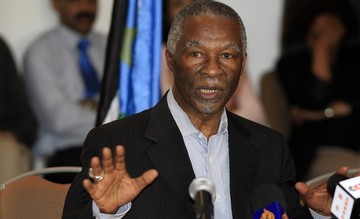Sudan formally accepts AU mediation proposal to defuse tensions with Juba
June 16, 2013 (KHARTOUM/JUBA) – The Sudanese government has officially announced its acceptance of proposals made by the head of the African Union High-level Implementation Panel (AUHIP), Thabo Mbeki aimed at bridging the gap with Juba.

He affirmed that the AUHIP proposals with regard to the demilitarized zone would secure withdrawal of South Sudan’s troops from occupied Sudanese areas adding that the timelines specified in the proposal falls within the 60-day deadline to stop the flow of South Sudan’s oil through Sudanese territory.
Tensions between the countries have escalated last week when Sudanese president Omer Hassan Al-Bashir ordered the closure of pipelines carrying oil from landlocked South Sudan.
Sudan also announced that it will put on hold cooperation agreements signed with South Sudan last year on a wide range of issues that included citizenship rights, security issues, banking and border trade.
Last March the two sides also agreed on the implementation schedule for these accords.
Juba said that the flow of oil has not stopped or abated despite Bashir’s directives while Khartoum emphasized that the process will take 60 days to complete and could be reversed if South Sudan gives up its support to anti-Khartoum insurgents.
Reuters said that diplomats doubt Sudan will actually close the two cross-border export pipelines because its economy has been suffering without South Sudan’s pipeline fees.
Oil used to be the main source for Sudan’s budget until southern secession in July 2011, when Khartoum lost 75 percent of its oil production and its status as oil exporter overnight.
The Sudanese foreign ministry spokesperson gave a glimpse of what is contained in the fresh AUHIP initiative.
On the border issue, the AUHIP suggested mandating the African Union Border Program (AUBP) to set up an advisory committee to determine the baseline for the demilitarized security zone (zero line) on the ground on the basis of the coordinates listed in the map provided by the AUHIP to the two parties.
The representatives from the Joint Border Verification and Monitoring Mission (JBVMM) would participate in the process of identifying the baseline which shall begin on Tuesday and will continues for six weeks during which time both parties should implement all agreements on the demilitarized zone.
On the issue of support for rebel groups on both sides, the AUHIP decided to assign the African Union Commission (AUC) and the head of The Intergovernmental Authority on Development (IGAD) to take the necessary steps to verify claims of support and harboring of rebels.
Each side shall provide the necessary information for the AUHIP no later than June 20 and shall expect to receive a response on the findings no later than June 25.
The AUHIP will inform the African Union Peace and Security Council (AUPSC) as well as the United Nations Security Council (UNSC) on the findings while the AUC and the head of the IGAD will suggest the necessary steps to address the issue of rebel support within the framework of the cooperation agreements.
Mbeki’s panel demanded that both sides work together to renounce and end any support to armed rebellion in the other country and urged them to fully and sincerely implement the security agreement signed in September 2012.
Khartoum accuses Juba of backing the Sudan Revolutionary Front (SRF) which has recently stepped up its military activities in Darfur and South Kordofan.
Last April the SRF moved its operations to North Kordofan and managed to briefly occupy the state’s second largest town of Um Rawaba much to the surprise of government and observers.
This week the Sudan People Liberation Movement North (SPLM-N), a member of SRF, shelled South Kordofan capital city of Kadugli.
SOUTH SUDAN ‘READY TO ENGAGE SUDAN’
On Sunday South Sudan said it has informally learned that Khartoum had accepted Mebki’s proposals.
“We not have received any direct communication from Sudan but we have learned that they have accepted the proposal by the African Union which would examine ways that would not affect the oil flow,” South Sudanese minister of information Barnaba Marial Benjamin said today.
Benjamin said his country remained committed to the full implementation of the nine cooperation agreements and the implementation matrix.
“As the government of the Republic of South Sudan, we are ready to engage Sudan for any discussion to examine ways to fully implement the cooperation agreement. There are already mechanisms in place to address complaints arising from the implementation process. We have Joint Political Security Mechanism (JPSM) and Joint Border Verification and Monitoring team (JBVMT). These are the bodies through which such complaints are addressed”, he told Sudan Tribune.
The government spokesperson said his country was also ready to hold discussions on the basis of the proposed discussions through the AUHIP.
“There is no problem at all. We do not have any objection. The position of the government has been to resolve differences through peaceful dialogue. So we are ready to hold discussion on the basis of the proposed discussions through the African Union”, he added.
(ST)
